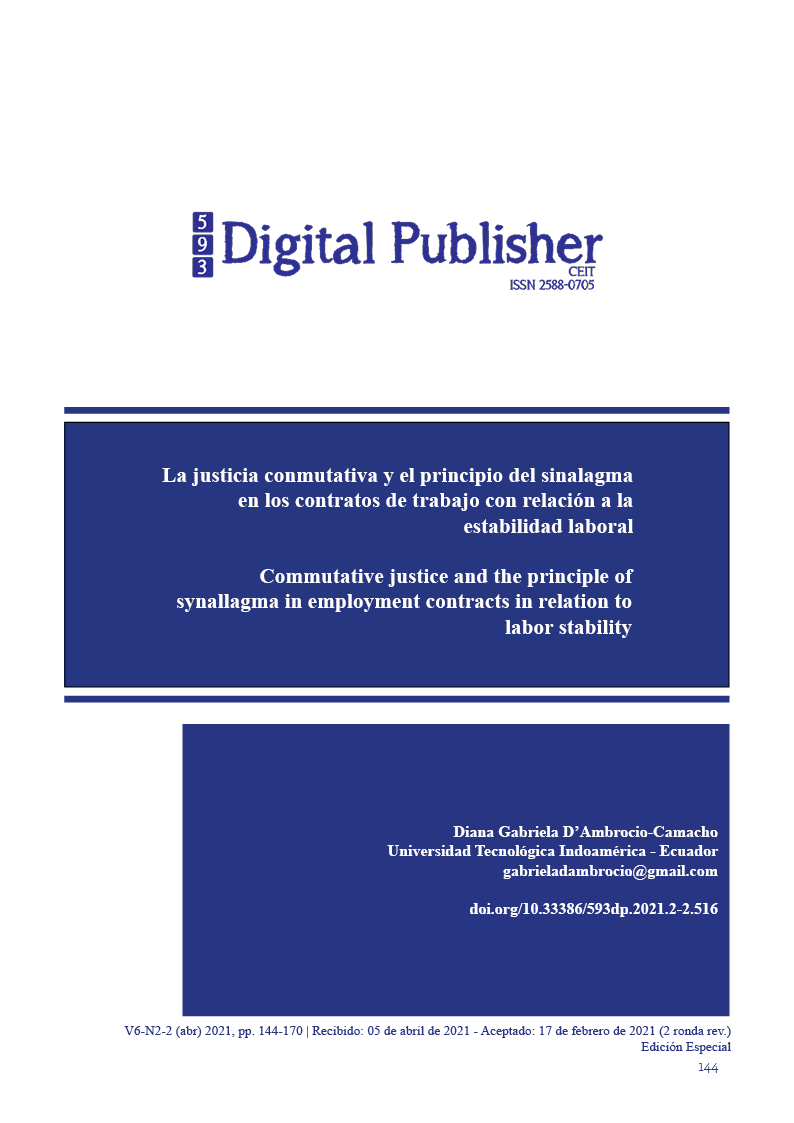Commutative justice and the principle of synallagma in employment contracts in relation to labor stability
Main Article Content
Abstract
The current law in its structure has not only rules, but also principles that underlie contemporary legislation, one of them is the traditional principle of reciprocity in changes or synalagma, which focuses on internal parts relationships and determines the existence of reciprocal considerations between the contracting parties. Now, as soon as one of the intervening parties fails to comply with the reciprocal consideration derived from the legal relationship reached by the agreement of wills, it generates an unjust act that gives way to the right of the aggrieved to request reparation and the consequent obligation of the counterpart to pay. In this sense, the consideration is not necessarily proportional, that is, it is not geometric as Aristóteles would refer to it, but rather it is arithmetic, because it looks at the parties as equals, focuses on the damage caused and seeks to restore the objective right and the equality, which can be through the payment of compensation, in order to materialize commutative or corrective justice, to achieve the ideal of justice and common good, as stated by Santo Tomás de Aquino. In this context, the labor stability of workers can be studied by overcoming the barrier that limits knowledge to the protective principle and the sub-principles that comprise it and transcending the analysis of the principle of anthropy and mainly that of reciprocity in changes or synalagma, which highlights the nature and specificity of the relationships that derive from the provision of work, recognized as the physical or intellectual effort that is provided in exchange for remuneration.
Downloads
Article Details

This work is licensed under a Creative Commons Attribution-NonCommercial-ShareAlike 4.0 International License.
1. Derechos de autor
Las obras que se publican en 593 Digital Publisher CEIT están sujetas a los siguientes términos:
1.1. 593 Digital Publisher CEIT, conserva los derechos patrimoniales (copyright) de las obras publicadas, favorece y permite la reutilización de las mismas bajo la licencia Licencia Creative Commons 4.0 de Reconocimiento-NoComercial-CompartirIgual 4.0, por lo cual se pueden copiar, usar, difundir, transmitir y exponer públicamente, siempre que:
1.1.a. Se cite la autoría y fuente original de su publicación (revista, editorial, URL).
1.1.b. No se usen para fines comerciales u onerosos.
1.1.c. Se mencione la existencia y especificaciones de esta licencia de uso.
References
Adame Goddard, J (1998). Filosofía social para juristas. México, McGraw-Hill, 1998.
Alioto, Daniel (2013). “Experiencia y Tradición en el Derecho Civil” en Prudentia Iuris, 76.
Anaya Heredia, Diana Patricia (2011). “Areté base política y cultural de Grecia”. Revista Educación y Ciencia, N° 14, año 2011.
Aristóteles (2010). Ética a Nicómaco. Madrid: Editorial Gredos, 2010.
Balmaceda, Catalina (2007). “Virtus Romana en el siglo I a-C”. Universidad Católica de Chile. Gerión 285 2007, 25, N° 1. https://core.ac.uk/Cicerón, Marco Tulio. De legibus, I, vi, 18. Cfr. Cicerón. Sobre las leyes. Edición Bilingüe. Traducción, notas e introducción Corso de Estrada, Laura. Colihue Clásica. Buenos Aires, 2019.
Clericó, Juan Manuel (2017). “La Tópica y la reciprocidad en los cambios en materia penal”, Biblioteca Universidad Católica Argentina, Prudentia Iuris Nº 83, 2017
Código Civil del Ecuador. Publicado en el Registro Oficial Suplemento N° 46 de 24 de Junio de 2005.
Código del Trabajo del Ecuador. Codificación 17. Publicada en el Registro Oficial Suplemento [1] N° 167 de 16 de diciembre de 2005. Reforma publicada en el Registro Oficial Suplemento [1] N° 229 de 22 de junio de 2020.
Concilio Vaticano II, Const. past. Gaudium et spes, 26: AAS 58 (1966) 1046-1047; Juan Pablo II, Carta enc. Laborem exercens, 9.18: AAS 73 (1981) 598-600. 622-625; y, León XIII, Carta enc. Rerum novarum: Acta Leonis XIII, 11 (1892) 128.
Convenio 87 de la Organización Internacional del Trabajo.
Convenio 98 de la Organización Internacional del Trabajo.
Corte Interamericana de Derechos Humanos (2019). Cuadernillo de Jurisprudencia N° 14. Igualdad y no discriminación.
Corte Interamericana de Derechos Humanos (1998). Caso Loayza Tamayo Vs. Perú Sentencia de 27 de noviembre de 1998. (Reparaciones y Costas).
Declaración Universal de Derechos Humanos (1948), adoptada y proclamada por la Resolución N° 217 A (III), de la Asamblea General de las Naciones Unidas, el 10 de diciembre de 1948.
De la Cueva, Mario (2005). El Nuevo Derecho Mexicano del Trabajo, Vigésima Edición, Tomo I, Editorial Porrúa, México.
De Marco, Florencia (2017). “La justicia en Aristóteles. Sobre la intersubjetividad en la justicia como valor” https://core.ac.uk/Pereira Fredes, Esteban (2014). “Acerca de la fundamentación de la obligatoriedad de los contratos: autonomía y derecho privado”. Revista de Derecho. Escuela de Postgrado Nº 6 Diciembre.
Díez Selva, Manuel (2019). “Los principios del Derecho Laboral”. Revista de la Facultad de Derecho de México. T LXIX, N° 273, Enero-Abril.
Díez Selva, Manuel (2017). El principio protectorio en el derecho laboral, Buenos Aires, Cathedra Jurídica.
Díez Picazo, L. y A.Gullón (1998). Instituciones de derecho civil. Madrid, Tecnos..
El Sumo Pontífice León XIII (1891). Carta Encíclica Rerum Novarum.
García, Alonso (1960). Derecho del Trabajo, T. II, Barceló.
Ghersi, Enrique (2009). “El problema del sinalagma”. Conferencia dictada el 28 de enero de 2009, en el Auditorio F.A. Hayek, Universidad Francisco Marroquín. http://articulos.ghersi.Guiborg, Ricardo (1999). Pensar las normas. Buenos Aires. Eudeba, 1999.
Hernández, María Meyboth (2018). “El trabajo como principio universal de los Derechos Humanos”. DerechoEcuador.com
Hevia, Martín (2010). “Justicia correctiva y derecho contractual”. Universidad Torcuato di Tella, Buenos Aires, Argentina. Revista Redialyc.
Huges, Kéraly (1974). “Explication au preface de la politique”. Paris,Nouvelles Editions Latines, II.
Jaramillo Dávila, Fabián (1977). Revista del Instituto del Derecho del Trabajo e investigaciones sociales; publicación semestral enero – diciembre de 1977; Vol. XIV, Núms. 23-24; Quito - Ecuador.
Jaramillo, C.I. (2013). Los deberes de evitar y mitigar el daño en el derecho privado. Bogotá, Editorial Temis S.A.
Kalmanovitz, Pablo (2010). “Justicia correctiva vs. justicia social en casos de conflicto armado”, Universidad de Columbia Nueva Yok, Estados Unidos. Revista Estudios Socio-Jurídicos.
Kenneth Galbraith, Jhon (1983). El dinero. Ediciones Orbis S.A. Traducción de J. Ferrer Aleu.
LAMAS, Félix Adolfo (2005). “Validez y vigencia del derecho, derecho natural y derecho positivo”, en Jornadas Internacionales de Derecho Natural, Pontificia Universidad Católica de Chile y Facultad de Derecho, Cátedra Internacional Ley Natural y Persona Humana (Raúl Madrid Ramírez – Felipe Widow, coordinadores), Chile 2005-2007.
Ley Orgánica de Discapacidades del Ecuador. Publicada en el Registro Oficial Suplemento N° 796 de 25 de septiembre de 2012.
López, Justo (1986). “Los principios de la justicia social y el derecho”, Moenia, N° XXVI/XXVII. Centro de Estudios Tomistas. Buenos Aires, septiembre-diciembre de 1986.
Martínez Rave, G. (1998) Responsabilidad Civil Extracontractual. Bogotá, Editorial Temis S.A.
Osorio y Morales (1965). Notas para una teoría general del contrato. RDP.
Plá Rodríguez, Américo (1990). Los principios del Derecho del Trabajo, ediciones De la Palma, Buenos Aires, segunda edición.
Pinilla, Antonio (1955). “Sophrosine”. Revista de la Universidad Católica del Perú. 1955 p. 89-90.
Portela, Jorge (2012). Orígenes y Desarrollo Histórico del Contractualismo Político. Editorial de la Universidad Católica Argentina. 1ª Ed. Buenos Aires.
PIO XI. Quadragésimo Anno (QA) (1931). Sobre a restauração e aperfeiçoamento da ordem social em conformidade com a Lei Evangélica. (QA, N° 57).
Rabinovich Berkman, Ricardo (2006). Recorriendo la Historia del Derecho, Editorial Cevallos, 2006.
Rawls, Jhon (2013). La Teoría dela Justicia. trad. de María Dolores González.
Rivero Lamas, Juan (1972). Tipificación y estructura del Contrato de Trabajo. Universidad de Zaragoza.
Rosado, Bruno Rodríguez (2013). Resolución y Sinalagma Contractual. Marcial Pons.
Sacristán, Estela (2017). “El concepto de dignidad humana en la jurisprudencia de la Corte Suprema de Justicia de la Nación”. Prudentia Iuris Nº 84.
Sandoval, Víctor Manuel (2016). “Historia, ciudadanía y derechos humanos. De la antiguedad al presente”. Revista History Agenda.
http://revistas.unam.mx/index.php/historiagenda/article/view/65346/57271
Santo Tomás de Aquino (2001). Suma de Teológica. Biblioteca de Autores Cristianos, Madrid.
Solarte Rodríguez, A. (2009). El principio de reparación integral del daño en el derecho contemporáneo. Tendencias de la responsabilidad civil en el siglo XXI. Bogotá, Pontificia Universidad Javeriana y Editorial Diké.
Vallet de Goytisolo, Juan (2003). “La Justicia según Santo Thomás de Aquino”. Arbor CLXXV, 691. Julio.
Viteri Llanga, Joaquín (2006). Derecho colectivo del trabajo, Editorial Produgrafil center, Quito Ecuador.


